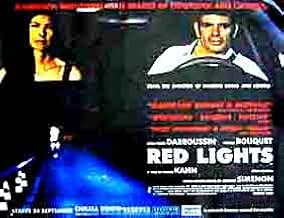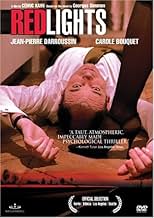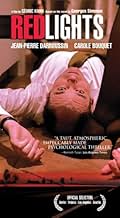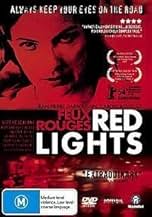IMDb RATING
6.6/10
3.2K
YOUR RATING
A cross-country trip turns out to be a nightmare for a troubled couple.A cross-country trip turns out to be a nightmare for a troubled couple.A cross-country trip turns out to be a nightmare for a troubled couple.
- Awards
- 2 nominations total
Featured reviews
The first few seconds of 'Feux Rouges' show Antoine - a mid-age Parisian insurance agent - writing a loving mail to his wife on the verge of a family vacation. The last few seconds of the movie show the couple exchanging loving smiles while driving to the South where they would pick the children from a camp to continue together the vacation. Everything goes wrong in the in-between.
'Feux Rouges' starts as a relationship drama and turns into a thriller and a wrong-turn movie. It is inspired by a novel of the Georges Simenon, and as many of Simenon's novels the characters are far from being great communicators. The lack of communication, the routine and maybe the differences in social positions make of Antoine an unhappy husband who is ready to spoil the start of the vacations by heavy drinking while on road. Much of the movie happens on the road, and the gradual tension building picking with the disappearance of the wife Helen strikes a cord of uneasiness and even claustrophobia - great achievement for a film filmed on highways and roads with the sky almost permanently on view. As in many of Simenon's novels there is a moralistic twist, and justice is made even if it is completely the result of hazard and not of the will of men. And there is a huge price to pay for this justice, which we only can guess as it happens out of the screen and story time.
Director Cedric Kahn has learned a few lessons in thrillers from the great masters, and fist of all from Hitchcock. Antoine is wonderfully played by Jean-Pierre Darroussin as the type of character that we know from the very first moment that he will get into trouble and he indeed does all to confirm this, but it is the character of Helene played by Carole Bouquet that he relates to all the time and who is his focal point of frustration, worry and love.The simplicity of the story telling, the careful gradation of tension towards horror, the low key ending which does not solve the conflict, but just postpones it beyond the duration of the screening make of this film a worth watching piece of cinema.
'Feux Rouges' starts as a relationship drama and turns into a thriller and a wrong-turn movie. It is inspired by a novel of the Georges Simenon, and as many of Simenon's novels the characters are far from being great communicators. The lack of communication, the routine and maybe the differences in social positions make of Antoine an unhappy husband who is ready to spoil the start of the vacations by heavy drinking while on road. Much of the movie happens on the road, and the gradual tension building picking with the disappearance of the wife Helen strikes a cord of uneasiness and even claustrophobia - great achievement for a film filmed on highways and roads with the sky almost permanently on view. As in many of Simenon's novels there is a moralistic twist, and justice is made even if it is completely the result of hazard and not of the will of men. And there is a huge price to pay for this justice, which we only can guess as it happens out of the screen and story time.
Director Cedric Kahn has learned a few lessons in thrillers from the great masters, and fist of all from Hitchcock. Antoine is wonderfully played by Jean-Pierre Darroussin as the type of character that we know from the very first moment that he will get into trouble and he indeed does all to confirm this, but it is the character of Helene played by Carole Bouquet that he relates to all the time and who is his focal point of frustration, worry and love.The simplicity of the story telling, the careful gradation of tension towards horror, the low key ending which does not solve the conflict, but just postpones it beyond the duration of the screening make of this film a worth watching piece of cinema.
After "L'ennui", this was the second Cédric-Kahn-movie I have seen, and I found it great. Kahn proves himself a specialist on ridiculous men lacking self-confidence and absolutely inapt to retain some dignity in a modern world like this.
The thriller plot, as stated by some earlier commentators, may be a little weak, especially as regards the "man on the run" (he is obviously taken directly from the Simenon novel but his character is neither fish nor foul). But this is not what it is all about. The thriller plot is merely an excuse to give a touching and disturbing portrayal of character Antoine (and his marriage).
Let me answer to two of the "plot holes" discovered by two other commentators: Antoine's drinking does make sense; he drinks because of frustration and a minority complex for not feeling man enough in the presence of his successful wife. His drinking is a childish act of defiance, he is not a sensible grown-up, not a man (as he keeps repeating himself). And of course, he doesn't recall all these telephone numbers from his memory; as indicated with one of the first calls, he calls directory inquiries and has himself connected to the respective partner each time (remember, there is cuts between the various calls).
Red Lights is a brilliant character study concealed as a masterpiece of suspense. Darroussin gives a touching performance in his role as hero and anti-hero at the same time. He is not particularly likable but still makes us feel sorry for him.
The ending, which I am not going to reveal here, is stirring in a very subtle way because above all it raises the question how it is all going to go on.
I like stories in which weird things happen out of character logic. This is a particular successful one.
The thriller plot, as stated by some earlier commentators, may be a little weak, especially as regards the "man on the run" (he is obviously taken directly from the Simenon novel but his character is neither fish nor foul). But this is not what it is all about. The thriller plot is merely an excuse to give a touching and disturbing portrayal of character Antoine (and his marriage).
Let me answer to two of the "plot holes" discovered by two other commentators: Antoine's drinking does make sense; he drinks because of frustration and a minority complex for not feeling man enough in the presence of his successful wife. His drinking is a childish act of defiance, he is not a sensible grown-up, not a man (as he keeps repeating himself). And of course, he doesn't recall all these telephone numbers from his memory; as indicated with one of the first calls, he calls directory inquiries and has himself connected to the respective partner each time (remember, there is cuts between the various calls).
Red Lights is a brilliant character study concealed as a masterpiece of suspense. Darroussin gives a touching performance in his role as hero and anti-hero at the same time. He is not particularly likable but still makes us feel sorry for him.
The ending, which I am not going to reveal here, is stirring in a very subtle way because above all it raises the question how it is all going to go on.
I like stories in which weird things happen out of character logic. This is a particular successful one.
Red Lights does not disappoint for artful cinematic tension, mining the rich resources of the French thriller -- no one can craft a thriller like the French. As the story unfolds, the viewer is driven increasingly into unease by the movie's primary conceit: the sudden unraveling of the milquetoast male lead before and then during a road trip into the country (in the throng of traffic during French vacation season) to pick up the couple's kids from camp. This ultimately has disastrous consequences for both husband and wife, despite their separating early in the story.
There are very effective touches here, unique to the French thriller. I especially liked Kahn's fearless willingness to run a protagonist straight into the ground so we can watch him grossly err and see him swerve into disaster, a risk most American directors wouldn't have the guts to take. He infuriates us and we are in total fear for him all at the same time. I also liked the way that Kahn can imbue simple sequences, like a series of phone calls, with utter tension.
What I did not like was the encroachment of pat, storytelling elements. The resolution is purely canned, and in particular there is one coincidence in the movie that is so Hollywood -- so Jerry Bruckheimer -- that it made me wince in embarrassment. It almost seems that, at the end, another director altogether stepped in to take the helm.
Red Lights is definitely worth seeing, but Kahn should have stayed the course with his somber, bold storytelling, rather than chickening out as he did. A good movie that could have easily been better.
There are very effective touches here, unique to the French thriller. I especially liked Kahn's fearless willingness to run a protagonist straight into the ground so we can watch him grossly err and see him swerve into disaster, a risk most American directors wouldn't have the guts to take. He infuriates us and we are in total fear for him all at the same time. I also liked the way that Kahn can imbue simple sequences, like a series of phone calls, with utter tension.
What I did not like was the encroachment of pat, storytelling elements. The resolution is purely canned, and in particular there is one coincidence in the movie that is so Hollywood -- so Jerry Bruckheimer -- that it made me wince in embarrassment. It almost seems that, at the end, another director altogether stepped in to take the helm.
Red Lights is definitely worth seeing, but Kahn should have stayed the course with his somber, bold storytelling, rather than chickening out as he did. A good movie that could have easily been better.
Opens with brilliantly shot sequences and if it then moves into more traditional French bourgeoisie territory it does it with passion and intelligence. As the narrative unfolds, involving a car drive that begins tetchy and proceeds to become really scary, we identify with the main protagonists and are as concerned as the male lead when the other disappears. A lot of the first part of the film is shot through the front screen of the car but this is so well done with the accompanying dialogue, developing tragedy and suspense we are almost on the edge of our seats. We lurch into nightmare territory and things become almost unbearable as we struggle to assure ourselves as to what is really happening. I was not as interested as the director in the relationship between the high flying wife and the husband who sees himself as her poodle and presumably this is why I found the ending simplistic and verging on the insulting, but never mind a good ride up to then!
A decent but ultimately disappointing thriller. It feels like slow-moving imitation Clouzot, with elements from Les Diaboliques ("What really happened?"), The Wages of Fear (high tension on a long drive), and Quai des Orfevres (a similar plot point I don't want to reveal here).
With tighter editing, "Feux rouges" could have been a much stronger movie. It does contain a number of memorable scenes, especially those involving the protagonist and his second passenger. Not a bad film at all, but it doesn't deserve the rave reviews it has drawn from several major critics.
7/10
With tighter editing, "Feux rouges" could have been a much stronger movie. It does contain a number of memorable scenes, especially those involving the protagonist and his second passenger. Not a bad film at all, but it doesn't deserve the rave reviews it has drawn from several major critics.
7/10
Did you know
- GoofsAt the beginning of the movie, the main characters meet at a cafe in the late afternoon. They then go home and get ready to travel to Bordeaux to pick up their kids. On the trip to Bordeaux, they are stuck in heavy traffic. Although it is now early evening, the vertical shadows cast by the cars indicate that the traffic scenes were shot at mid-day.
- ConnectionsEdited into Le documentaire culturel: Le siècle de Simenon (2014)
- SoundtracksNuages
from "Nocturnes"
Written by Claude Debussy
Performed by Etienne Baudo and LOrchestre de l'Opéra national de Paris
Conducted by Manuel Rosenthal
- How long is Red Lights?Powered by Alexa
Details
- Release date
- Country of origin
- Official site
- Languages
- Also known as
- Kırmızı ışıklar
- Filming locations
- Cléré les Pins, France(The garage where Antoine has his tyre changed.)
- Production companies
- See more company credits at IMDbPro
Box office
- Gross US & Canada
- $673,828
- Opening weekend US & Canada
- $3,202
- Aug 22, 2004
- Gross worldwide
- $2,394,429
- Runtime
- 1h 45m(105 min)
- Color
- Sound mix
- Aspect ratio
- 1.85 : 1
Contribute to this page
Suggest an edit or add missing content



























